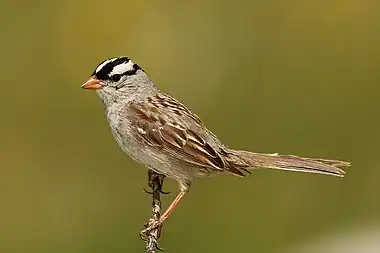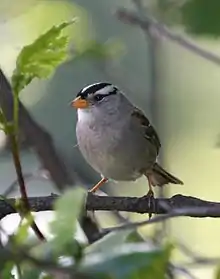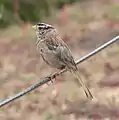White-crowned sparrow
The white-crowned sparrow (Zonotrichia leucophrys) is a species of passerine bird native to North America. A medium-sized member of the New World sparrow family, this species is marked by a grey face and black and white streaking on the upper head. It breeds in brushy areas in the taiga and tundra of the northernmost parts of the continent and in the Rocky Mountains and Pacific coast. While southerly populations in the Rocky Mountains and coast are largely resident, the breeding populations of the northerly part of its range are migratory and can be found as wintering or passage visitors through most of North America south to central Mexico.
| White-crowned sparrow Temporal range: | |
|---|---|
 | |
| Scientific classification | |
| Domain: | Eukaryota |
| Kingdom: | Animalia |
| Phylum: | Chordata |
| Clade: | Dinosauria |
| Class: | Aves |
| Order: | Passeriformes |
| Family: | Passerellidae |
| Genus: | Zonotrichia |
| Species: | Z. leucophrys |
| Binomial name | |
| Zonotrichia leucophrys (Forster, 1772) | |
 | |
| Range of Z. leucophrys Breeding Migration Year-round Nonbreeding | |
Etymology
The scientific name is from Ancient Greek. The genus name Zonotrichia is from Ancient Greek ζώνη (zone, transl. band) and θρίξ (thrix, transl. hair). The species name leucophrys is from λευκός (leukos, transl. white) and ὀφρῡ́ς (ophrus, transl. eyebrow).[2]
Description
Adults have black and white stripes on their head, a gray face, brown streaked upper parts and a long tail. The wings are brown with bars and the underparts are gray. Their bill is pink or yellow. They are similar in appearance to the white-throated sparrow, but do not have the white throat markings or yellow lores.[3]
Measurements:[4]
- Length: 5.9-6.3 in (15-16 cm)
- Weight: 0.9-1.0 oz (25-28 g)
- Wingspan: 8.3-9.4 in (21-24 cm)
Subspecies

There are five currently recognized subspecies of white-crowned sparrow (pugetensis, gambelii, nuttalli, oriantha, and leucophrys), varying in breeding distribution migratory route. Birds of the subspecies nuttalli are permanent residents in California, while birds of the subspecies gambelli may migrate as far as the Arctic Circle during the summer breeding season. Northern birds migrate to the southern United States and northern Mexico.
Distribution
Their breeding habitat is brushy areas across northern Canada and the western United States.
The white-crowned sparrow is a very rare vagrant to western Europe.[5] It has been sighted in England, Scotland,[5][6] Ireland,[7] and Norway.[8] In 2008 a white-crowned sparrow was spotted in Cley next the Sea in Norfolk, England.[9] To commemorate the event an image of the bird was included in a window at St Margaret's Church.
Behaviour
These birds forage on the ground or in low vegetation, but sometimes make short flights to catch flying insects. They mainly eat seeds, other plant parts and insects. In winter, they often forage in flocks.[3]
White-crowned sparrows nest either low in bushes or on the ground under shrubs and lay three to five brown-marked gray or greenish-blue eggs.[3]
The white-crowned sparrow is known for its unihemispheric slow-wave sleep, which allows it to stay half-awake for up to two weeks during migration.[10] This effect has been studied for possible human alertness applications in shift work and truck driving.[11][12][13]
Recent studies by ornithologists including Elizabeth Derryberry have shown that white-crowned sparrow songs are affected by human activity and noise.[14]
Images
 Adult
Adult.jpg.webp) Immature White-crowned Sparrows have more muted plumage.
Immature White-crowned Sparrows have more muted plumage. Subspecies nuttalli at Point Lobos State Reserve, California
Subspecies nuttalli at Point Lobos State Reserve, California Depiction of a white-crowned sparrow in window in St Margaret's Church, Cley next the Sea, Norfolk
Depiction of a white-crowned sparrow in window in St Margaret's Church, Cley next the Sea, Norfolk
References
- BirdLife International (2020). "Zonotrichia leucophrys". IUCN Red List of Threatened Species. 2021: e.T22721088A136821496. doi:10.2305/IUCN.UK.2021-3.RLTS.T22721088A136821496.en. Retrieved 3 January 2023.
- Jobling, James A. (2010). The Helm Dictionary of Scientific Bird Names. London, United Kingdom: Christopher Helm. pp. 224, 414. ISBN 978-1-4081-2501-4.
- Chilton, G., M. C. Baker, C. D. Barrentine, and M. A. Cunningham. 1995. White-crowned Sparrow (Zonotrichia leucophrys). In The Birds of North America, No. 183 (A. Poole and F. Gill, eds.). The Academy of Natural Sciences, Philadelphia, and The American Ornithologists' Union, Washington, D.C.
- "White-crowned Sparrow Identification, All About Birds, Cornell Lab of Ornithology". allaboutbirds.org. Retrieved 29 September 2020.
- Broad, R. A.; Hawley, R. G. (1980). "White-crowned Sparrows: new to Britain and Ireland". British Birds. 73 (10): 466–470.
- "Rare bird found in coastal garden". BBC News. 9 January 2008. Retrieved 12 August 2011.
- Hussey, Harry (2003). "The White-crowned Sparrow in County Cork". Birding World. 16 (5): 203–5.
- "American mob-sparrow declares war on Norway". Archived from the original on 7 October 2009.
- Unwin, Brian. "White-crowned Sparrow boosts local tourism". The Telegraph. Archived from the original on 28 August 2009. Retrieved 28 October 2014.
- "It's Wake-Up Time". Wired Website. 1 November 2003. Retrieved 28 July 2010.
- Rattenborg, Niels C.; Mandt, Bruce H.; Obermeyer, William H.; Winsauer, Peter J.; Huber, Reto; Wikelski, Martin; Benca, Ruth M. (13 July 2004). "Migratory Sleeplessness in the White-Crowned Sparrow (Zonotrichia leucophrys gambelii)". PLOS Biology. 2 (7): E212. doi:10.1371/journal.pbio.0020212. PMC 449897. PMID 15252455.
- "Alaska sparrow migration mystery". Far North Science Website. 6 November 2007. Retrieved 28 July 2010.
- "Circadian and Masking Control of Migratory Restlessness in Gambel's White-Crowned Sparrow (Zonotrichia leucophrys gambelii)". Journal of Biological Rhythms. 1 February 2008. Retrieved 28 July 2010.
- Derryberry, Elizabeth P.; Phillips, Jennifer N.; Derryberry, Graham E.; Blum, Michael J.; Luther, David (30 October 2020). "Singing in a silent spring: Birds respond to a half-century soundscape reversion during the COVID-19 shutdown". Science. 370 (6516): 575–579. doi:10.1126/science.abd5777. ISSN 0036-8075. PMID 32972991.
Further reading
- Kroodsma DE, Baker MC, Baptista LF & Petrinovich L. (1985). Vocal "dialects" in Nuttall's white-crowned sparrow. In Johnston, R F [Editor] Current Ornithology 103-133, 1985. Plenum Press, 233 Spring Street, New York, New York.
External links
- White-crowned sparrow species account - Cornell Lab of Ornithology
- White-crowned sparrow - Zonotrichia leucophrys - USGS Patuxent Bird Identification InfoCenter
- "White-crowned sparrow media". Internet Bird Collection.
- White-crowned sparrow photo gallery at VIREO (Drexel University)
- Interactive range map of Zonotrichia leucophrys at IUCN Red List maps
